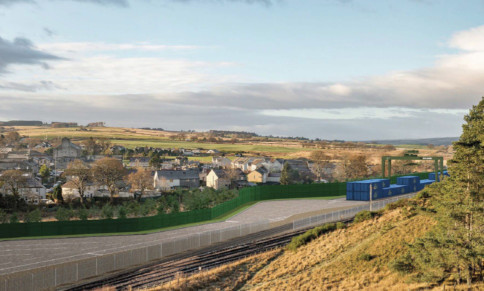Bottled water giant Highland Spring has won permission to build a controversial freight train depot despite an angry backlash from residents.
People in Blackford were left fizzing over the company’s multimillion-pound bid for a rail yard expansion at the edge of the village. The move involves the installation of a huge crane and a storage area for more than 100 shipping containers.
Highland Spring bosses said the project was vital to slash the firm’s carbon footprint and help the business grow.
But the proposal came up against opposition from neighbours who argued an increase in HGVs travelling to and from the site would pose a road safety risk. They also claimed the site would be noisy and the 60ft crane would overshadow surrounding homes.
Perth and Kinross Council received nearly 100 letters and emails calling for the scheme to be scrapped.
But members of the development management committee yesterday unanimously backed the application.
Brian McCluskey, operations director for Highland Spring, said the business, formed in Blackford in 1979, is now the second-biggest bottled water firm in the UK, selling to 50 countries worldwide.
“We always strive to do the right thing by people affected by the business. Unfortunately, on this occasion, it is going to be impossible to keep everyone happy,” he said.
He added that the rail yard expansion would see 20 fewer HVGs travelling through Blackford and would lead to a significant cut in emissions.
“I believe we have done all we can to engage with the community,” he said. “I know that some people will not be happy, but we believe we have struck the right balance.”
Councillor Murray Lyle called for the plan to be approved, saying: “Inevitably, this will bring change to the village, but I’m sure many people on Moray Street will be pleased they won’t have so many lorries going past their homes.”
Objector Dr Alison Dawson was not allowed to speak at yesterday’s meeting, because her request was not submitted before a deadline.
She said afterwards: “We do not agree with the assessment that noise generation can be controlled. We believe there are noise-related grounds for rejecting the application.”
Dr Dawson said the bid should have been rejected on the grounds it was contrary to the council’s Local Development Plan and said the committee should not have been obliged to approve it because of its effect on carbon emissions.
